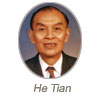AWARDEE OF MATHEMATICS AND MECHANICS PRIZE
WU CHENGKANG
Wu Chengkang, born in Nov,1929, in Shanghai, China. Received Sc.D. degree from the Massachusetts Institute of Technology, USA in 1957. After returning to China in 1957, he has done research work in the Power Laboratory and Institute of Mechanics of the Chinese Academy of Sciences, and the 207 and 701 Research Institutes of the 7th Ministry of Machinery. He is now a research professor in the Institute of Mechanics, CAS(Chinese Academy of Science). He was elected the academician of the CAS in 1991.
Wu Chengkang has done a wide range of research in the field of high temperature gasdynamics, and is an internationally known expert in combustion and plasma technology. He emphasizes both basic and applied research, and always answers the call of needs for the national interest. In early years, he developed the speed-of-sound method for measuring the instantaneous gas temperature in a gasoline engine, and used it to clarify the mechanism of “engine knock”. He developed the shock tube method for measuring the ignition delay of combustible mixtures. In 1983, he used the stagnation flat flame and laser velocimetry to study the velocity distribution in a laminar flame, and by noting the effect of flame stretch on relative velocity between the flame and the unburned gas, he and coworkers arrived at the “truly one-dimensional burning velocity of laminar flames”. This work clarified the puzzling scatter of data over many years on flame speed measurements.
He and his group developed the technology of “soot removal by the combustion gas pulse method”, now widely used in Chinese utility boilers.They also developed several methods of “creating and controlling recirculating flowfields by nonsymmetrical jets for use in stabilizing flames of low grade pulverized coal and coal water slurry”.
In the area of thermal protection and electromagnetic signals blackout during atmospheric re-entry of high-speed vehicles, Wu has done much experimental study, which were helpful in the solution of the problem, and was rewarded prizes for his achievements.






